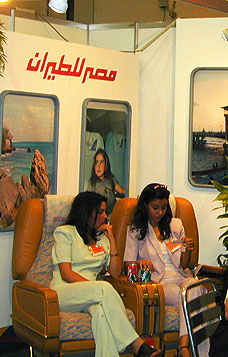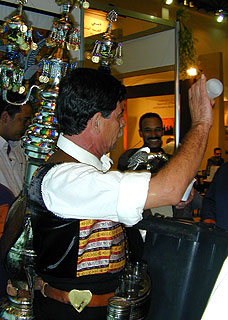|
|
register now
for site updates
(type your email here)
|
|
|
|
|
|

|
|
|
|

|
|
|
|
|
|
Until their minds are at rest
by Tarek Atia
At a travel fair in Cairo, the biggest question is "What's next?"
 At the Mediterranean Travel Fair currently taking place at the Cairo International Conference Center, the mood is understandably hesitant. It's the same mood you'll find all over the world -- an unknowing air tainting everything with its gloom, ever since the attacks on the Twin Towers and the Pentagon.
At the Mediterranean Travel Fair currently taking place at the Cairo International Conference Center, the mood is understandably hesitant. It's the same mood you'll find all over the world -- an unknowing air tainting everything with its gloom, ever since the attacks on the Twin Towers and the Pentagon.
That the events in the US and their aftermath would "overshadow the Fair" is a given. The organizers -- the Egyptian Ministry of Tourism and Reed Travel Exhibitions -- admitted as much at the Fair's opening, according to the Travel Trade Gazette. The paper quotes Tourism Minister Mamdouh El-Beltagui saying there had been a cancellation rate of 18 per cent in the week after the tragedy.
 Tourism is down -- that goes without saying. Cancellations are the norm, and for most people, the idea of a holiday is now something to be postponed.
Tourism is down -- that goes without saying. Cancellations are the norm, and for most people, the idea of a holiday is now something to be postponed.
Participants at the Fair are also wondering whether a deeper problem has emerged: people losing faith in planes. Civil aviation is the backbone of the travel industry -- nobody's got the vacation time or the patience to do 40-day journeys by ship or train and the like.
According to Sarwat Fareed, sales manager at the Egyptian agent of some of the US's most well known cruise ships and vacation airlines, "people will delay or cancel their travels until their minds are at rest."
Fareed's company has had a 50 per cent decrease in reservations since September 11, and is looking for alternatives -- other areas where he can send tourists. The US isn't exactly a popular destination right now.
"We know how to deal with crises," he says, mentioning the Gulf War and Luxor massacre. "There needs to be quicker action. Shows and exhibitions will not solve the problem. It's a matter of marketing parallel tracks."
Fareed believes theUS terror attacks' effects on the Egyptian travel industry will be even greater than those that resulted from the 1997 Luxor massacre, in which 58 tourists were killed, because this is "an international incident."
Taysir Fahim, of the Marketing Department at the Egyptian Hotels Association, agrees that "everyone's waiting to see what will happen," but says that the effect on Egyptian tourism will be far less than Luxor, which analysts say took two years to recover from.
Fahim's booth near the entrance of the Fair features a poster showing the steady growth rates in Egypt's number of rooms, hotels, and beds from 1975 to the present day. It's mostly been an upwards climb, but now, just as Egypt was making significant strides, will things become much harder again?
Tom Nutley, who directs the company that organized the fair, faced this tough question in his remarks at the opening: The tourism industry has "been through crises before but comes back every time and is more resilient. It continues to grow. In the long term, it will be the largest employer of people is the world." But, Nutley admitted, "the short-term effects will hit the industry, particularly the airlines."
Nutley's remarks put in perspective the dry spells that the tourism industry -- both in Egypt and worldwide -- must face as the world is changed into a new dynamic. The terror in the world -- so often targeted at tourism and business -- is clearly someone's outcry against this form of new global economy. Accusations are hurled back and forth, but is anyone really listening?
"There's nothing we can do. Everyone has to wait and see," Fahim says. One thing groups like the Hotel Association are doing is emphasizing the need to be present at the World Travel Market show in London in November. Fahim says Egyptian hotels have been clear in emphasizing they want to be present. There have been very few cancellations.
Everyone was certainly here at the Mediterranean Travel Fair, at least. Dubai, Egypt, Spain, Cyprus, Jordan, Lebanon and many other nations and companies had great presence and attractive booth with interactive activities for fair-goers' pleasure. Dubai's impressive tourism manual is a hefty tome filled with slick photos and handy information. Even the ads are a pleasure to see, playing with the typical stereotypes about the Middle East. Below a picture of a beautiful golf course, it says, "It's full of sand, sand and more sand." The next picture is of a turquoise beach, as far as the eye could see. "No water for miles around" it says. Then there's a picture of 4x4s racing in the desert, below which it says, "The only means of transport are camels."
The catch line -- "Everything you heard about Dubai is true" -- is a classic case of turning stereotypes on their head. But it takes the risk of showing you can laugh at yourself, while attempting to tell your true story at the same time.
Overall, the dull nervousness permeating the Fair was unable to cloud over the dreams that had been built and were still being envisaged. Things like the Marsa Alam Ras Ghaleb Egyptian resort town 300 km south of Hurghada, its brochure imagining a vibrant community, hotels and an airport -- "A whole new world".
Hopes were clearly still high, despite the troubled times.
(September 26, 2001)
 At the Mediterranean Travel Fair in Cairo, a licorice juice seller, ornate and traditional, danced a jig every once in a while and for the most part made a show of his trade.
At the Mediterranean Travel Fair in Cairo, a licorice juice seller, ornate and traditional, danced a jig every once in a while and for the most part made a show of his trade.
Did you like this article? Send your comments to comments@cairolive.com
Go to the front page pics and dispatches archives
|
|
|